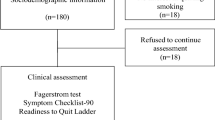Abstract
People with severe mental illness are less likely to quit successfully. Popular models of behaviour change focus on planning as key to successful quitting. Symptoms of severe mental illnesses can limit the psychological forces available for quitting and impede planning. This study used Interpretative Phenomenological Analysis to explore naturalistic quitting success among people with severe mental illness. Analysis of the experiences of fifteen participants who had quit smoking for periods ranging from one week to eight years were used to develop definitions of spontaneous, unplanned and planned smoking cessation. People with severe mental illness should be supported with the method of their choosing, rather than emphasizing planning in all cases.

Similar content being viewed by others
References
American Psychiatric Association (2013). Diagnostic and statistical manual of mental disorders: DSM-V. D.C., American Psychiatric Association: Washington.
Borland, R., Balmford, J., & Swift, E. (2015). Effects of encouraging rapid implementation and/or structured planning of quit attempts on smoking cessation outcomes: a randomized controlled trial. Annals of Behavioral Medicine, 49(5), 732–742.
Cooper, J., Borland, R., Yong, H.-H., Mcneill, A., Murray, R., O'Connor, R. J., et al. (2010). To what extent do smokers make spontaneous quit attempts and what are the implications for smoking cessation maintenance? Findings from the international tobacco control four country survey. Nicotine & Tobacco Research, 12, S51–S57.
Cooper, J., Mancuso, S. G., Borland, R., Slade, T., Galletly, C., & Castle, D. (2012). Tobacco smoking among people living with a psychotic illness: the second Australian survey of psychosis. Australian and New Zealand Journal of Psychiatry, 46, 851–863.
Department Of Human Services (2007). An analysis of the victorian rehabilitation and recovery care service system for people with severe mental illness and associated disability. Melbourne: Victorian Government.
Farkas, M. (2007). The vision of recovery today: what it is and what it means for services. World Psychiatry, 6, 4–10.
Ferguson, S. G., Shiffman, S., Gitchell, J. G., Sembower, M. A., & West, R. (2009). Unplanned quit attempts - results from a U.S. sample of smokers and ex-smokers. Nicotine & Tobacco Research, 11, 827–832.
Greene, P. A., & Diclemente, C. C. (2010). Searching for Mechanisms of Change within Treatment: A Look at Abstinence Self-Efficacy. Alcoholism-Clinical and Experimental Research,, 34, 225a–225a.
Kotz, D. & West, R. 2008. Explaining the social gradient in smoking cessation: It's not in the trying, but in the succeeding. Tob Control, online 20 Oct 2008, 1–13
Larabie, L. C. (2005). To what extent do smokers plan quit attempts? Tobacco Control, 14, 425–428.
Larkin, M., Watts, S., & Clifton, E. (2006). Giving voice and making sense in interpretive phenomenological analysis. Qualitative Research in Psychology, 3, 102–120.
Lawn, S. (2004). Cigarette smoking in psychiatric settings: occupational health, safety, welfare and legal concerns. Australian and New Zealand Journal of Psychiatry, 39, 886–891.
Liamputtong, P., & Ezzy, D. (2005). Qualitative research methods. South Melbourne: Oxford University Press.
Moeller-Saxone, K. (2008). Cigarette smoking and interest in quitting among consumers at a psychiatric disability rehabilitation and support service in Victoria. Australian and New Zealand Journal of Public Health, 32, 479–481.
Moeller-Saxone, K. (2013). Succesful smoking cessation and mental illness : comparing the transtheoretical model and prime theory doctor of philosophy. University of Melbourne.
Morgan, V., Waterreus, A., Jablensky, A., Mackinnon, A., Mcgrath, J. J., Carr, V., Bush, R., Castle, D., Cohen, M., Harvey, C., Galletly, C., Stain, H. J., Neil, A., Mcgorry, P., Hocking, B., Shah, S. & Saw, S. 2011. People Living with Psychotic Illness 2010. In: AUSTRALIA, C. O. (ed.). Canberra: Department of Health and Ageing.
Murray, R. L., Mcneill, A., Lewis, S., Britton, J., & Coleman, T. (2010). Unplanned attempts to quit smoking: a qualitative exploration. Addiction, 105, 1299–1302.
Ogden, J., & Hills, L. (2008). Understanding sustained behavior change: the role of life crises and the process of reinvention 10.1177/1363459308094417. Health (London, England), 12, 419–437.
Prochaska, J. O. (2011). What do we know about unplanned quit attempts? Practically nothing or nothing practical? Addiction, 106, 2014–2015.
Prochaska, J. O., Diclemente, C. C., & Norcross, J. C. (1992). In search of how people change: applications to addictive behaviors. American Psychologist, 47, 1102–1114.
Prochaska, J. O., Norcross, J. C., & Diclemente, C. C. (1994). Changing for good. New York: Avon.
Sendzik, T., Mcdonald, P. W., Brown, K. S., Hammond, D., & Ferrence, R. (2011). Planned quit attempts among Ontario smokers: impact on abstinence. Addiction, 106, 2005–2013.
Smith, J. A. (Ed.) (2008). Qualitative psychology: A practical guide to research methods. London: SAGE.
Taylor, G., Mcneill, A., Girling, A., Farley, A., Lindson-Hawley, N. & Aveyard, P. 2014. Change in mental health after smoking cessation: systematic review and meta-analysis
West, R. (2007). The P.R.I.M.E. Theory of motivation as a possible foundation for the treatment of addiction. In J. E. Henningfield, P. B. Santora, & W. K. Bickel (Eds.), Addiction treatment: science and policy for the twenty-first century. Baltimore: The Johns Hopkins University Press.
West, R. 2011. PRIME theory of motivation [online]. Available: http://www.primetheory.com/index.php.
West, R., & Sohal, T. (2006). "Catastrophic" pathways to smoking cessation: findings from national survey. BMJ, 332, 458–460.
Willig, C. (2012). Qualitative interpretation and analysis in psychology New York. McGraw Hill Education.
Wing, V. C., Wass, C. E., Soh, D. W., & George, T. P. (2012). A review of neurobiological vulnerability factors and treatment implications for comorbid tobacco dependence in schizophrenia. Annals of the New York Academy of Sciences, 1248, 89–106.
Author information
Authors and Affiliations
Corresponding author
Rights and permissions
About this article
Cite this article
Moeller-Saxone, K., Segan, C. The Role of Planning in Naturalistic Quitting Success Among People with Severe Mental Illness. Int J Ment Health Addiction 14, 526–538 (2016). https://doi.org/10.1007/s11469-015-9609-3
Published:
Issue Date:
DOI: https://doi.org/10.1007/s11469-015-9609-3




